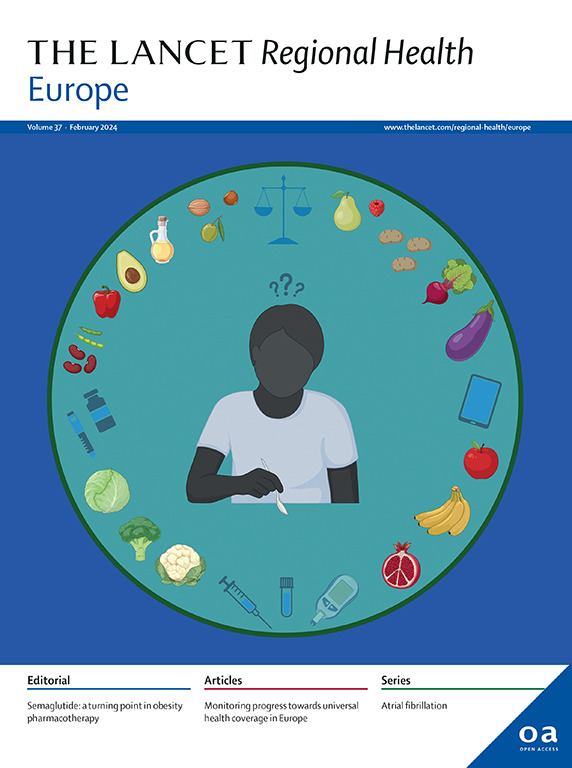Sex-specific associations between sleep apnoea and lung cancer risk in patients with COPD: a nationwide prospective cohort study
IF 13.6
Q1 HEALTH CARE SCIENCES & SERVICES
引用次数: 0
Abstract
Background
COPD is an established risk factor for lung cancer. Sleep apnoea is prevalent in COPD and the inflammation caused by intermittent hypoxaemia may increase this lung cancer risk. Females have more systemic inflammation for a similar apnoea-hypopnoea index than males. Therefore, this study aims to investigate sex-specific associations between sleep apnoea and lung cancer in COPD.
Methods
The sex-specific absolute and relative risk of sleep apnoea on newly diagnosed lung cancer was estimated in a nationwide observational study of Belgian patients with COPD (≥55 years), between 2017 and 2022, using an Aalan-Johanson estimator and a cause-specific Cox regression model adjusted for age, socioeconomic status, smoking status, alcoholism, frailty, comorbidities, and comedication.
Findings
The study consisted of 62,903 COPD patients (42·80% female), of whom 2898 (4·60%) developed lung cancer. We found a significant sex interaction of sleep apnoea on lung cancer hazard (χ-squared: 13·239, P-interaction < 0·01). In females, sleep apnoea was associated with a higher lung cancer risk (cumulative incidence: 1545 vs 1350 per 100,000 PY; aHR: 1·31 (95% CI: 1·05–1·63)). For males, sleep apnoea patients had a lower lung cancer risk (cumulative incidence: 1632 and 2305 per 100,000 PY; aHR: 0·82 (95% CI: 0·70–0·95)). The impact of sleep apnoea on lung cancer development was especially strong in female COPD patients with hypoxia-related comorbidities e.g., with a history of emphysema (aHR: 2·65 (95% CI: 1·11–6·34)).
Interpretation
Sleep apnoea was associated with a higher risk of lung cancer in female COPD patients while, in males, there was a lower risk. Especially in female COPD patients with hypoxia, sleep apnoea is strongly associated with an increased lung cancer risk.
Funding
Emmanuel van der Schueren cancer research fellowship “Kom Op Tegen Kanker”.
COPD患者睡眠呼吸暂停与肺癌风险之间的性别特异性关联:一项全国性前瞻性队列研究
背景:慢性阻塞性肺病是肺癌的一个确定的危险因素。睡眠呼吸暂停在慢性阻塞性肺病中很普遍,间歇性低氧血症引起的炎症可能会增加这种肺癌的风险。相似的呼吸暂停-低通气指数,女性比男性有更多的全身性炎症。因此,本研究旨在探讨睡眠呼吸暂停与COPD患者肺癌之间的性别特异性关联。方法在2017年至2022年期间,在比利时COPD患者(≥55岁)的一项全国性观察性研究中,使用aalan - johnson估计器和针对年龄、社会经济地位、吸烟状况、酗酒、虚弱、合并症和药物进行调整的病因特异性Cox回归模型,估计新诊断肺癌的睡眠呼吸暂停的性别特异性绝对和相对风险。研究共纳入62903例COPD患者(42.80%为女性),其中2898例(4.60%)发展为肺癌。我们发现睡眠呼吸暂停与肺癌风险存在显著的性别交互作用(χ 2: 13·239,P-interaction <;0·01)。在女性中,睡眠呼吸暂停与更高的肺癌风险相关(累计发病率:1545 vs 1350 / 100,000 PY;aHR: 1.31 (95% CI: 1.05 - 1.63)。对于男性,睡眠呼吸暂停患者的肺癌风险较低(累计发病率:1632和2305 / 100,000 PY;aHR: 0.82 (95% CI: 0.70 - 0.95)。睡眠呼吸暂停对有缺氧相关合并症(如有肺气肿史)的女性COPD患者肺癌发展的影响尤为明显(aHR: 2.65 (95% CI: 1.11 - 6.34))。睡眠呼吸暂停与女性COPD患者患肺癌的风险较高相关,而男性COPD患者患肺癌的风险较低。尤其是女性COPD缺氧患者,睡眠呼吸暂停与肺癌风险增加密切相关。资助emmanuel van der Schueren癌症研究奖学金“Kom Op Tegen Kanker”。
本文章由计算机程序翻译,如有差异,请以英文原文为准。
求助全文
约1分钟内获得全文
求助全文
来源期刊

Lancet Regional Health-Europe
Multiple-
CiteScore
19.90
自引率
1.40%
发文量
260
审稿时长
9 weeks
期刊介绍:
The Lancet Regional Health – Europe, a gold open access journal, is part of The Lancet's global effort to promote healthcare quality and accessibility worldwide. It focuses on advancing clinical practice and health policy in the European region to enhance health outcomes. The journal publishes high-quality original research advocating changes in clinical practice and health policy. It also includes reviews, commentaries, and opinion pieces on regional health topics, such as infection and disease prevention, healthy aging, and reducing health disparities.
 求助内容:
求助内容: 应助结果提醒方式:
应助结果提醒方式:


